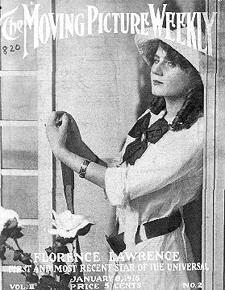 |

 |
|
of Hollywood Then and Now The Biograph Girl, A Novel of Hollywood Then and Now by William J. Mann; Kensington Publishing Company; 458 pages; $23.00.
In 1910 Lawrence left Griffith, as movie stars tend to do, for Carl Laemmle's Independent Motion-Picture Company (IMP), and became the IMP Girl. Unfortunately, Lawrence's soon began to fall, and by 1915 she was a has-been. In 1938, Florence Lawrence, sick of it all, committed suicide by drinking ant poison. Or did she? What if Florence Lawrence did not die in 1938 but lived on to become a 107-year old woman living in a Catholic nursing home in Buffalo, New York? Such is the premise of The Biograph Girl, William J. Mann's novel of Hollywood then and now. Mann established his credentials as a film historian with Wisecracker, his award-winning biography of William Haines, Hollywood first openly gay star. For The Biograph Girl, Mann resurrected another relatively-unknown figure from the silent film era, though this time in fictional form. Flo, we are told, faked her death in order to start a new life away from Hollywood and "Florence Lawrence". As Florence Bridgewood, a wisecracking, chain-smoking centenarian, Flo is happy to live in the present, save for a few well-chosen reminiscences. That is until journalist Richard Sheehan meets Flo in her nursing home and realizes that she is not all that she seems to be. Soon the rediscovered Florence Lawrence becomes a bone of contention between Richard and his twin brother Ben, a failed film maker. The openly-gay Richard, like William J. Mann, is both a writer and a handsome, muscular, successful "golden boy". Ben, on the other hand, is an out-of-shape hetero who can't seem to make ends meet or wear the proper clothes. Are these stereotypes or what? A nicer character is Sister Jean, the nursing home director who tries to protect Flo from the horrors of modern publicity but is, herself, all too human. Needless to say, Mann is at his best in the chapters dealing with Flo's past as Florence Lawrence, the Biograph Girl. Through him we meet Flo as a girl, the pawn of a domineering stage mother. We follow her break into show business, become a star, and recoil from the pressures of stardom. We meet her again in 1938, working as an extra for MGM and, finally, making the fateful decision that changes her life forever. Mann is careful to remain true to the facts, except of course when fact becomes fiction.
 Is The Biograph Girl a "gay novel"? Let's see. The author is gay.
Richard is gay. Richard's lover Rex is gay--and a PWA, which gives the
novel a subplot that is never quite resolved. "Ducks", the entertainer who
helps raise Flo as a girl is also gay, as are several other minor characters.
And certainly any novel that combines old Hollywood, the Castro Theater,
Oprah Winfrey, Rosie O'Donnell and John Waters has got to be at least a bit
queer.
Is The Biograph Girl a "gay novel"? Let's see. The author is gay.
Richard is gay. Richard's lover Rex is gay--and a PWA, which gives the
novel a subplot that is never quite resolved. "Ducks", the entertainer who
helps raise Flo as a girl is also gay, as are several other minor characters.
And certainly any novel that combines old Hollywood, the Castro Theater,
Oprah Winfrey, Rosie O'Donnell and John Waters has got to be at least a bit
queer.
Gays have always been fascinated by Hollywood. From childhood, we have followed the movies as an escape from straight reality into a fabulous new world. William J. Mann, who's quite fascinating himself, has made a major contribution to Hollywood lore with The Biograph Girl. Thanks to Mann, what historian Kevin Brownlow called "the parade's gone by" passes once again before our fascinated eyes.
In another corner of the world (Washington, D.C.) the Gay, Lesbian, Bisexual and Transgendered (GLBT) Book Awards Committee of the American Library Association has just announced the winners of the 2001 GLBT Book Award. Gaylaw: Challenging the Apartheid of the Closet by William N. Eskridge (Harvard University Press), was named the winner of the Award for non-fiction. Affinity, a novel by Sarah Waters (Riverhead) won top honors in the literature category. The GLBT Book Awards will be presented at the ALA's Annual Conference in San Francisco in June |
 © 1997-2002 BEI
© 1997-2002 BEI
 Florence Lawrence (1890-1938) was the world's first movie star. Born Florence
Bridgewood in Hamilton, Ontario, she began her career as Baby Flo, the Child Wonder
Whistler. She made her first film in 1906 and by 1908 was the world-famous
"Biograph Girl", the star of D. W. Griffith's Biograph films.
Florence Lawrence (1890-1938) was the world's first movie star. Born Florence
Bridgewood in Hamilton, Ontario, she began her career as Baby Flo, the Child Wonder
Whistler. She made her first film in 1906 and by 1908 was the world-famous
"Biograph Girl", the star of D. W. Griffith's Biograph films.